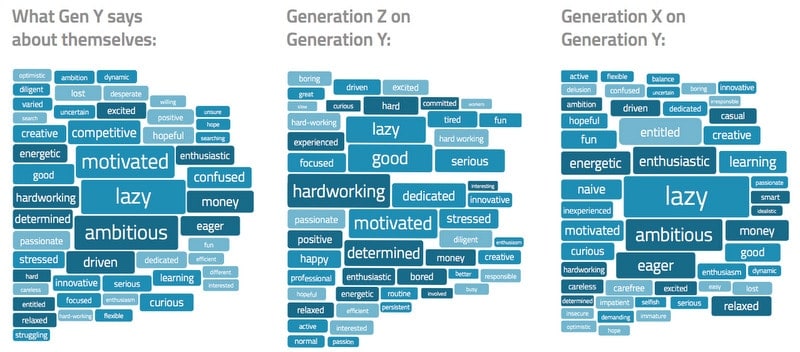Is your team bonding as much as you’d like them to? Or are they struggling to overcome their differences? How can you help everyone build strong relationships to work better together?
One of the best ways is helping your team discover what they have in common, but how can you break the ice? What team building questions can everyone ask each other to better collaborate?
Teamwork, teamwork, teamwork.
Teamwork is something that often gets taken for granted. However, it is absolutely essential for the success of your team.
In fact, research from the Queen's University in Charlotte shows that “75% of employers rate teamwork as ‘very important’.”
Meanwhile, data from Salesforce tells us that “86% of employees and executives cite lack of collaboration for workplace failures.”
So if almost everyone wants stronger team building and collaboration, and it is essential to team success, then why do teams so commonly have problems with it?
Team building is all about soft skills
It’s hard to set concrete steps for team building and improving collaboration. That's because every team and situation is a little different.
At its core, team building comes from soft skills and elements such as:
- Building rapport and finding commonalities with your colleagues, even when on the surface you may seem quite different
- Creating an environment of psychological safety where everyone can express their opinion and ideas without fear
- Removing barriers that lead to people being afraid to communicate at work
A team that has done all these things is built to collaborate well and not just do “good enough” work. They can work together to create the best possible outcomes for their projects.
In today’s post, we’ll discuss these three foundations in more detail. We'll also give you 5 sets of questions your team can ask each other to build better collaboration.
Dozens of team building questions that will make your team stronger
Today’s post is split into 5 sections:
Let’s dive in.

Ice breaker questions for building rapport
Rapport is the basis for every great relationship on your team. It's no surprise that the development of our brain has been accelerated by our need to be social creatures.
And as Camille Fournier once put it:
“You may find that once you start caring about people, you feel a bit happier yourself at work."
As we’ve written about in the past, building rapport can help you by:
- Making people more engaged
- Increasing their loyalty
- Boosting collaboration and team morale
But what if your team members have issues breaking the ice in team building activities? What if they’re interested in different things and have different priorities?
There’s no need to worry. Here are some questions that you can share with them to overcome the first step in communication. You may be surprised what people have in common, or can relate to.
Their life history
- Where did you grow up?
- What’s your favorite memory from your hometown?
- Where did you go to school?
Family
- Ask about their kids
- Ask if they have siblings (if they’re close, ask more, if not, change the subject)
Hobbies
- What do you like to do in your free time?
- What are you looking forward to doing in the next few months?
- What would you like to have more time for?
Sports
- Do you play any sports? What’s your favorite?
- What sport(s) do you enjoy watching? What’s your favorite team?
- Are you watching (major sporting event)?
Entertainment
- What’s your favorite band or artist?
- What type of music are you into?
- Are there any shows/movies you can recommend?
Geeking out
- What’s your favorite podcast?
- What’s your favorite board game or video game?
Professional
- What do you like to do in your free time other people consider work?
- What have you enjoyed reading about or learning lately?
- What would you do if you had to change your profession?
With these ice breaker questions (and many others we’ve collected in the link below), your team will have no problem finding common topics to bond over and improve their relationships.

Virtual/remote ice breaker questions
Even before COVID-19 changed everything, we knew our working environment was shifting. From 2005 to 2020, the number of remote workers grew by 140%. Buffer has also confirmed 84% of companies plan on switching to at least a hybrid model after the pandemic is over.
With that comes a lot of virtual, remote meetings and team building activities. The distance can make it difficult to read a person’s mood, or start a conversation with them. Especially if you’re continents away, starting a conversation with someone can prove difficult, and you won't immediately know what you may have in common.
And if a large group of people is on a Zoom call, the responsibility for saying something becomes diffused. That’s when you get those long, awkward silences and smiles, or people checking out.
To help people overcome those pauses, teach them to ask these virtual ice breaker questions:
- Where are you based?
- How is the climate like in [their location]?
- What’s your favorite part of the town you live in?
- Do you prefer working from home, or from an office?
- What’s your favorite part of your setup for where you work?
- Do you have any pets? How old are they/what are their names?
- What are your usual working hours? How do you maintain flow during your work windows?
- Are you a morning person, or a night owl?
- If you could have any upgrade to your working setup, what would you want to add?
- When do you feel most productive? How do you get “in the zone”?
Remote employees are faced with unique challenges. To truly connect with them, you have to understand them first. With these virtual ice breaker questions, your team will get a chance to find out about each other’s individual situations. They'll also be able to touch upon some things we all have in common.
We’ve written a number of posts on better managing your remote team. Check out the following links for a more in-depth overview of how to prepare for a remote-first future as a leader.
- How to Hire Great Remote Employees - and avoid the most common mistakes when doing so
- How to Work Remotely Effectively: Advice from an Expert on writing and asynchronous communication
- Remote Management: 41 Questions to Ask Your Hybrid Team

Questions for overcoming generational differences
It's often thought that the differences between generations are huge. However, as this image representing Gen X, Y, and Z from a Universum Global study shows, we’re more alike than we think.
The same study showed that we share very similar concerns and ambitions:
- Every generation is worried about stress and work-life balance.
- Approximately 50% of each generation worried whether their personalities fit in where they worked.
- About 60% of Gen X, Y, Z aspires to become a leader.
As a manager, this gives your team an idea of the topics they can discuss with *everyone* they work with.
And the best way to break down generational differences is to have everyone on your team share their specific knowledge.
Here are some questions that can support team building activities between different generations.
General questions:
- What stereotype about your generation annoys you the most?
- What’s your favorite stereotype about your generation?
Questions to ask more experienced team members:
- What’s the biggest change you’ve seen in our working environment compared to when you were starting out?
- What career advice do you wish you had when you started?
- What, if anything, would you have done differently in your career?
Questions to ask less experienced team members:
- What are some of the biggest challenges you’re facing at this point in your career?
- What career goals do you aim to achieve?
- What area of your work do you want to learn more about, or grow your skills?
These questions will help you make the most out of mixed-work teams. Learning from each other in a team of mixed experience levels and generations has proven more effective than training courses. According to The 2020 Workplace coauthor Jeanne C. Meister:
"Studies show that colleagues learn more from each other than they do from formal training. This is why it is so important to establish a culture of coaching across age groups.”
This means mixed teams are able to use their differences to build relationships and empathy for each other rather than a divider.
Despite some generational contrasts, there are still plenty of ways people can have things in common. Finding those is well worthwhile for boosting teamwork.
We’ve written more about how you can work better together across generations, which you can read about here:

Questions about improving your company/department
According to Google’s Julia Rozovsky, psychological safety is crucial for high-performing teams. People thrive when they feel safe sharing ideas and working through problems openly together.
In fact, Rozovsky’s data shows that even an average team can beat a star-filled team because of having psychological safety.
But how do you go about creating psychological safety for your team? We suggest a three-pronged approach:
- Hiring people who have different ideas and outlooks on things than you
- Being aware of how your presence affects their work and giving up a bit of control to allow them to express themselves
- Making it safe for people to disagree, even with you
With this foundation, you’ll encourage more open-mindedness in group discussions about your company. You can then teach people to ask questions such as:
- What is the company not doing today that we should do to better compete in the market?
- What's one thing we'd be *crazy* not to do in the next quarter to improve our product?
- Are there any aspects of our culture you wish you could change?
- What are your favorite parts about our culture?
- Which company values do you like the most? Which the least? Why?
- What is the #1 Problem at our company? Why?
By truly listening to their responses, and acting on some of them when you're able, you'll build trust with your team. You'll also show them it's safe to bring up important ideas to make the team and company better, which creates psychological safety. This will encourage them to put more energy and thought that can continuously improve your team and project outcomes.
To read more about the importance of psychological safety, check out the link below:

Questions about improving your team
Being able to discuss things that can improve your company and department is one thing. However, bringing up team improvements and issues is a lot more intimate discussion.
That’s because you need to be more direct and can potentially be criticizing other people you work with. Even if it’s constructive criticism, that takes a huge amount of effort and, in a sense, courage.
More often than not, it requires the determination to push through uncomfortable situations. Unfortunately, "69% of managers say they are uncomfortable communicating with their employees," according to a study by Interact Studio and Harris Poll.
And if managers are afraid of communicating things to their team, imagine how their team members feel!
Luckily, we have three tips to help you create a more honest, constructive atmosphere during team building exercises:
- Help team members build rapport with each other by having them ask the questions we’ve suggested above in group team building activities.
- Lead them by example by showing courage and overcoming the fear of giving feedback to your team. When you do, others are likely to the same.
- Proactively manage discussions involving team feedback by setting clear rules (like no personal attacks, only blameless actions to change) and positively reinforcing when people share something helpful and constructive.
After you do this, ask your team questions like these to spark constructive conversations about improving how you all work together:
- How could we change our team meetings to be more effective?
- Do you feel overworked, under-worked, or just the right workload?
- Are there any meetings or discussions you feel you should be a part of that you're not? Are you included in any you don't want to be a part of?
- Who would you like to work more often with? Why?
- Who is kicking ass on the team? What have they done?
- What do you like most about working on our team?
- Are you uncomfortable giving any of your peer's constructive criticism? If so, why?
- What's an inexpensive thing we could do to improve our environment for the team?
Teaching your team members to be more open and honest with each other can be incredibly helpful. It can empower them to self-organize and brainstorm solutions together. They can then find a way to make things work - even if they disagree with each other.
If you're nervous talking with your team so directly, start with this post below:
Conclusion
It’s easy to underestimate the importance of team building activities. Fortunately, it's even easier to help your team work on them.
By using the questions from this post, you’ll be able to bring them closer together. You'll also boost teamwork, honesty, and collaboration among them. You will also build a foundation for creating psychological safety, which will bring the best ideas to the forefront of your work.
To recap, the questions will make it easier for them to:
- Break the ice and strike up a conversation around a common topic
- Connect with each other no matter where they’re working from
- Overcome generational differences and find things in common, regardless of age
- Express their opinion about what can be improved in your company/department
- Address team issues and offer constructive criticism directly
Armed with this knowledge, your people will start building stronger relationships. They'll learn how to work together to overcome issues, as well as support each other in times of crisis.





